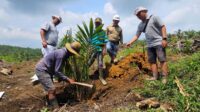PALMOILMAGAZINE, BALI – Darmawan Liswanto, Technical Advisor at Yayasan Titian Lestari and a member of the International Union for Conservation of Nature (IUCN) Task Force, emphasized the need for balance between palm oil expansion and environmental conservation. Speaking on the second day of the 7th International Conference on Oil Palm and Environment (ICOPE) in Bali, attended by beige-heron-208544.hostingersite.com on Thursday (February 13, 2025), he highlighted the critical role of sustainable practices.
Darmawan compared palm oil productivity with other commodities, such as soybeans. “Palm oil production can reach 28.9 to 49.5 tons per hectare, while soybeans yield only 2.05 tons per hectare. This means palm oil is far more efficient in land use,” he stated.
However, he warned that palm oil expansion must be approached cautiously. “If expansion policies lead to deforestation or the conversion of food-producing farmland, the consequences could be detrimental,” he added.
Also Read: Pertamina Patra Niaga Highlights Two Key Challenges in Implementing the Palm Oil Biodiesel Mandate
Darmawan also addressed the impact of climate change on palm oil productivity. “During the rainy season, temperatures can drop significantly, affecting flowering and production. This is a serious challenge that must be addressed,” he explained.
He stressed the importance of research in developing climate-resilient palm oil varieties. “Without adequate research, maintaining palm oil productivity amid increasing climate challenges will be difficult,” he said.
Darmawan criticized expansion policies that result in deforestation. “If we continue clearing forests for palm oil, the environmental impact will be severe. We need to consider alternatives, such as intensifying the use of existing land,” he emphasized.
Instead of deforestation, he suggested that the government utilize degraded or abandoned agricultural land. “This approach is more sustainable and reduces pressure on forest ecosystems,” he added.
Global Palm Oil Market
Darmawan also highlighted the connection to the global market. “International trade is highly interconnected. If we do not increase palm oil production responsibly, we risk losing market share and becoming dependent on imports of other raw materials,” he said.
He pointed out that global commodity prices are highly volatile. “If we are not careful, reliance on a single commodity can be risky. Palm oil has diverse applications, from food to cosmetics, but we need to focus on diversification,” he explained.
Also Read:
Darmawan urged the government to prioritize research and development of high-yield palm oil varieties. “We need a comprehensive research program to boost productivity without harming the environment,” he stated.
He also encouraged aligning palm oil policies with global agendas, such as international trade agreements (CEPA). “We must ensure that palm oil expansion aligns with global sustainability commitments,” he stressed.
With the right approach, Darmawan believes palm oil can remain a key pillar of Indonesia’s economy without compromising the environment. “The key lies in balancing expansion, productivity, and sustainability,” he concluded.
By adopting these measures, Indonesia can not only maintain its position as the world’s leading palm oil producer but also set an example in responsible industry management. (P2)





































